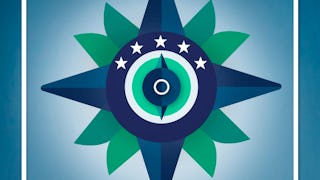The MOOC introduces learners to key environmental health and natural resources management challenges associated with the rapid growth in international tourist arrivals into low-income countries. Since infrastructural and regulatory capacities in such countries are often limited they are more exposed to the negative implications of such development. The MOOC will present experiences and potential avenues to develop a more sustainable form of tourism.



Sustainable Tourism – promoting environmental public health

Instructor: Flemming Konradsen
42,670 already enrolled
Included with
(1,359 reviews)
Skills you'll gain
Details to know

Add to your LinkedIn profile
12 assignments
See how employees at top companies are mastering in-demand skills

There are 3 modules in this course
This module will present the global trends in tourism and its social and environmental impacts. Policies and strategies aimed at developing a more sustainable form of tourism in low-income countries will be discussed, including the role of sustainability certification systems for hotels and destinations. The importance of tourism to Zanzibar and the environmental health impacts associated with the tourist sector on Zanzibar will be highlighted.
What's included
5 videos9 readings4 assignments1 discussion prompt
This module will highlight the role of hotels, in low-income countries in tropical and sub-tropical regions of the world, as significant consumers of freshwater and producers of wastewater. The module will discuss the impacts this may have on the health of the marine ecosystem and the management of the freshwater resources, especially the problem of saltwater intrusion. Zanzibar will be used as a case. The potential of introducing new policies, technologies and management approaches in support of a more sustainable management of water resources will be discussed.
What's included
4 videos8 readings4 assignments
The general challenges of managing solid waste generation by the tourist sector will be highlighted and examples provided to explain the scope of the problem. The extent and nature of the obstacles associated with poor solid waste management linked to the tourist sector on Zanzibar will be discussed focusing on the environmental health impacts of waste generation. Policies and private sector initiatives taken to improve waste management will be presented. In particular, environmental management interventions aimed at mosquito control at resorts will be highlighted as an example of how to develop a more sustainable tourist sector.
What's included
5 videos9 readings4 assignments3 discussion prompts
Instructor

Offered by
Explore more from Basic Science
 Status: Preview
Status: Preview Status: Preview
Status: PreviewUniversitat Autònoma de Barcelona
 Status: Preview
Status: PreviewUniversidad de Palermo
 Status: Preview
Status: PreviewUniversity of Copenhagen
Why people choose Coursera for their career




Learner reviews
1,359 reviews
- 5 stars
74.83%
- 4 stars
19.49%
- 3 stars
3.75%
- 2 stars
0.95%
- 1 star
0.95%
Showing 3 of 1359
Reviewed on May 3, 2020
This was a wake call for me and how much of an impact tourism has on the environment. I think this course should be shared with the hospitality and tourism industry at large.
Reviewed on Aug 6, 2020
Great course materials and easy to understand. Gives clear idea about of importance of sustainable tourism and role played by us to contribute back to the community which we live in.
Reviewed on Aug 21, 2020
Tourism is a catalyst of change especially in the environmental aspect. I have learned a lot with this course and an eye opener for me as a government tourism influencer. Thank you.

Open new doors with Coursera Plus
Unlimited access to 10,000+ world-class courses, hands-on projects, and job-ready certificate programs - all included in your subscription
Advance your career with an online degree
Earn a degree from world-class universities - 100% online
Join over 3,400 global companies that choose Coursera for Business
Upskill your employees to excel in the digital economy
Frequently asked questions
To access the course materials, assignments and to earn a Certificate, you will need to purchase the Certificate experience when you enroll in a course. You can try a Free Trial instead, or apply for Financial Aid. The course may offer 'Full Course, No Certificate' instead. This option lets you see all course materials, submit required assessments, and get a final grade. This also means that you will not be able to purchase a Certificate experience.
When you purchase a Certificate you get access to all course materials, including graded assignments. Upon completing the course, your electronic Certificate will be added to your Accomplishments page - from there, you can print your Certificate or add it to your LinkedIn profile.
Yes. In select learning programs, you can apply for financial aid or a scholarship if you can’t afford the enrollment fee. If fin aid or scholarship is available for your learning program selection, you’ll find a link to apply on the description page.
More questions
Financial aid available,

